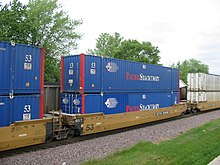This article needs additional citations for verification. (April 2014) |

| Admiralty law |
|---|
| History |
| Features |
| Contract of carriage/Charterparty |
| Parties |
| Judiciaries |
| International conventions |
| International organizations |
In transportation, freight refers to goods conveyed by land, water or air,[1] while cargo refers specifically to freight when conveyed via water or air.[2][3] In economics, freight refers to goods transported at a freight rate for commercial gain. The term cargo is also used in case of goods in the cold-chain, because the perishable inventory is always in transit towards a final end-use, even when it is held in cold storage or other similar climate-controlled facilities, including warehouses.
Multi-modal container units, designed as reusable carriers to facilitate unit load handling of the goods contained, are also referred to as cargo, especially by shipping lines and logistics operators. When empty containers are shipped each unit is documented as a cargo and when goods are stored within, the contents are termed containerized cargo. Similarly, aircraft ULD boxes are also documented as cargo, with an associated packing list of the items contained within.
- ^ "Freight Definition & Meaning". Dictionary.com. Retrieved 2023-06-27.
- ^ "Cargo Definition & Meaning". Dictionary.com. Retrieved 2023-06-27.
- ^ "CARGO Definition & Legal Meaning". Black's Law Dictionary (2nd ed.). 4 November 2011. Archived from the original on 24 January 2023. Retrieved January 24, 2023.